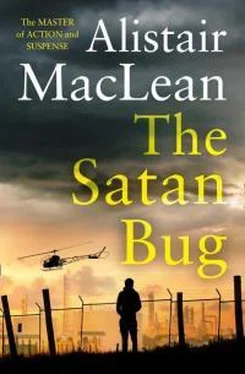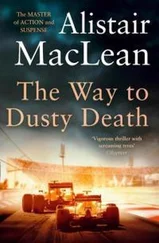Алистер Маклин - The Satan Bug
Здесь есть возможность читать онлайн «Алистер Маклин - The Satan Bug» — ознакомительный отрывок электронной книги совершенно бесплатно, а после прочтения отрывка купить полную версию. В некоторых случаях можно слушать аудио, скачать через торрент в формате fb2 и присутствует краткое содержание. Год выпуска: 2011, Издательство: Sterling, Жанр: Боевик, Шпионский детектив, на английском языке. Описание произведения, (предисловие) а так же отзывы посетителей доступны на портале библиотеки ЛибКат.
- Название:The Satan Bug
- Автор:
- Издательство:Sterling
- Жанр:
- Год:2011
- ISBN:нет данных
- Рейтинг книги:3 / 5. Голосов: 1
-
Избранное:Добавить в избранное
- Отзывы:
-
Ваша оценка:
- 60
- 1
- 2
- 3
- 4
- 5
The Satan Bug: краткое содержание, описание и аннотация
Предлагаем к чтению аннотацию, описание, краткое содержание или предисловие (зависит от того, что написал сам автор книги «The Satan Bug»). Если вы не нашли необходимую информацию о книге — напишите в комментариях, мы постараемся отыскать её.
The Satan Bug — читать онлайн ознакомительный отрывок
Ниже представлен текст книги, разбитый по страницам. Система сохранения места последней прочитанной страницы, позволяет с удобством читать онлайн бесплатно книгу «The Satan Bug», без необходимости каждый раз заново искать на чём Вы остановились. Поставьте закладку, и сможете в любой момент перейти на страницу, на которой закончили чтение.
Интервал:
Закладка:
I walked two hundred yards from the courtyard along a narrow cobbled lane. When the wall gave way to a high wooden fence I reached for the top, pulled myself up, slipped quietly down on the other side and set off along the railway tracks.
The reference book compilers who assert that Clapham Junction has more sets of parallel tracks than any place in Britain wouldn’t go around making silly statements like that if they’d tried this lot on a pitch black October night with the sleety rain falling about their ears. There wasn’t a single piece of ironware in the whole interminable width of those tracks that I didn’t find that night, usually with my ankles and shins. Railway lines, wires, signalling gear, switch gear, hydrants, platforms where there shouldn’t have been platforms – I found them all. To add to my discomfort the burnt cork that had been so heavily rubbed into my face and hands was beginning to run, and burnt cork tastes exactly as you would expect it to taste: and when it gets in your eyes it hurts. The only hazard I didn’t have to contend with was live rails – the power had been switched off.
I found the fence on the other side of the track easily enough, just by walking into it. Once down in the lane on the other side I turned left and made my way towards the fire-escape which came down, I had been told, into a small recessed court. I found the court, crossed the entrance and flattened myself against the far wall. The fire-escape was there all right, just barely discernible twenty feet away against the fractionally lighter darkness of the sky, gaunt and stark and angular and zigzagging upwards out of sight. The first two or three flights of the fire-escape were invisible, lost against the darkness of high walls beyond.
For three minutes I stood there, showing as many signs of life as a wooden Indian. Then I heard it – even above the drumming of the sleet on my sodden shoulders and the sound of water running in the gutters, I heard it: the slight shuffle of a shoe on the pavement as someone changed his cramped position. The sound didn’t come again, but then I didn’t need to hear it again. Once was enough. Someone was standing directly under the lowermost platform of the fire-escape and if he turned out to be the soul of innocence doing it for his health’s sake it would be surprising, to say the least. It was also going to be unfortunate for him, but he wouldn’t be caring much when he was dead.
Finding this man here didn’t give me any feeling of dismay and frustration because of the possible threat and setback he offered, all it afforded me was the sense of profound satisfaction and relief that could not be described. I had gambled, but I had won. Dr. Gregori was doing exactly what I’d told the General and Hardanger he would be doing.
The knife came free of its sheath and I brushed the blade with the ball of my thumb. It had a point like a lancet and an edge like a scalpel. It was only a very little knife, but three and a half inches of steel can kill you just as dead as the longest stiletto or the heaviest broadsword. If you know where to hit, that is. I had a fair idea where to hit, and how. And at anything up to ten paces I was twice as accurate with a knife as with a gun.
I covered sixteen of the intervening twenty feet in just over ten seconds, making no more sound than the moonlit shadow of a drifting snowflake. And now I could see him, quite clearly. He was directly under the first platform of the fire-escape to get what shelter he could from the rain. His back was to the wall. His head was bowed, as if his chin was resting on his chest, as if he was half-asleep on his feet. He’d only to glance sideways under raised eyelids and he’d have had me.
He wasn’t going to remain so obligingly unseeing for an indefinite period. I twisted the knife until the blade pointed upwards, then found myself hesitating. Even with Mary’s life in the balance I found myself hesitating. Whoever this character was I’d little doubt but that he deserved to die anyway. But to knife an unsuspecting and half-asleep man, however much he deserved it? This wasn’t the war any more. I slid out the Webley, quiet as a mouse tiptoeing past a sleeping cat, caught the barrel and swung for a spot just below the dripping brim of his hat, just behind the left ear, and because I was feeling illogically angry about my uneasiness in knifing him I struck him very hard indeed. The sound was the sound of an axe sinking deep into the bole of a pine. I caught and lowered him gently to the ground. He wouldn’t wake up before dawn. Maybe he’d never waken again. It didn’t seem to matter. I started up the fire-escape.
There was no hurry, no haste, in my going. Haste could be the end of it all. I went up the steps slowly, one at a time, always staring upwards. I was too near the end of the road now to let rashness be the ruin of everything.
After the sixth or seventh flight of steps I slowed down even more, not because my leg and queer shortness of breath were troubling me, which they were, but because I had become suddenly aware of an area of diffused light in the darkness of the wall above me, where a light had no right to be. There shouldn’t have been any light anywhere, for all the lights of Central London were out.
If ghosts were allowed to have black faces – though I suspected mine was getting pretty streaky by this time – then I went up the next flight of steps like a ghost. As I approached the light I could see that it came not from a window but from a grille-work door set in the wall. Cautiously, I raised my head to the level of this door and peered inside.
It was on a level with the massive iron girders that spanned and supported the roof of the station. At least a dozen lights were burning inside the station, small, weak, isolated sources of illumination that served only to emphasise the depth of the gloom that lay over most of the huge and cavernous building. Six of the lights were directly above sets of hydraulic buffers at the end of tracks, and I suddenly realised why they were burning there: some lights are essential to the safe operation of a railway station and those must have been battery-powered lamps designed to come on in the event of a power failure. A prosaic enough explanation and, I was sure, the correct one.
I looked for some moments at the geometric tracery of soot-blackened girders that dwindled and vanished into impenetrable darkness at the farthest reaches of the station, then put a slight experimental pressure on the door. It gave under my hand. And the damned thing squeaked, like a gibbet creaking in the night wind. A gibbet with a corpse on it. I put the thought of corpses out of my mind and withdrew my hand from the door. Enough was enough.
But the door was sufficiently open to let me see a couple of vertical iron ladders leading away from the steel platform just inside. One led upwards to a long gangway immediately below the vast skylights, the other down to another gangway about the level of the highest of the lights inside the station: the former would be for the window-cleaners, the latter for the electricians. It was a great help to me to know that. I straightened. At least six flights of stairs to go yet before I started getting really interested.
The arm that locked round my throat and started throttling the life out of me belonged to a gorilla, a gorilla with a shirt and jacket on, but a gorilla for all that. In those first two hellish seconds of immobilised shock and pain I thought my neck was going to snap, and before I could even begin to react something hard and metallic smacked down on my right wrist and sent the Webley flying from my grasp. It struck the iron platform and then spun off into space.
I never heard it land on the roadway beneath. I was too busy fighting for my life. With my left hand – my right hand was momentarily paralysed and quite useless – I reached up, caught his wrist and tried to tear his arm away. I might as well have tried to tear a four-inch bough from an oak tree. He was phenomenally strong and he was squeezing the life out of me. And not slowly.
Читать дальшеИнтервал:
Закладка:
Похожие книги на «The Satan Bug»
Представляем Вашему вниманию похожие книги на «The Satan Bug» списком для выбора. Мы отобрали схожую по названию и смыслу литературу в надежде предоставить читателям больше вариантов отыскать новые, интересные, ещё непрочитанные произведения.
Обсуждение, отзывы о книге «The Satan Bug» и просто собственные мнения читателей. Оставьте ваши комментарии, напишите, что Вы думаете о произведении, его смысле или главных героях. Укажите что конкретно понравилось, а что нет, и почему Вы так считаете.












